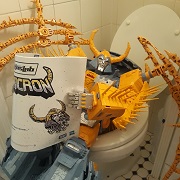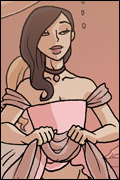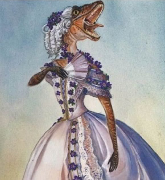|
disposablewords posted:Kobolds are outright still little dog (or at least mammalian) people in AD&D 2e, it was a noteworthy change that Wizards made them lizardy and tied to dragons in 3rd Edition. Japanese nerd-media dog kobolds are most different in that they're often depicted as big dudes almost like dog gnolls instead of dog goblins. 2nd ed monster manual doesn't say if they are mammals or reptiles, but it does state that they lay eggs 
|
|
|
|

|
| # ? May 11, 2024 07:19 |
|
disposablewords posted:Kobolds are outright still little dog (or at least mammalian) people in AD&D 2e, it was a noteworthy change that Wizards made them lizardy and tied to dragons in 3rd Edition. Japanese nerd-media dog kobolds are most different in that they're often depicted as big dudes almost like dog gnolls instead of dog goblins.
|
|
|
|
Yeah, I can only assume Jun Suemi thought the scales were a hauberk. What was really weird to me was how in the 2e era you had the creepy bug-eyed kobolds and then DiTerlizzi's scaleless, ratlike kobolds.
|
|
|
|
i think the most important feature of kobolds is hating gnomes and they are right to do so
|
|
|
|
Terrible Opinions posted:This is not true. The 1st edition monster manual specifically gives them scales, says they have no hair, and lay eggs. In the illustrations though they bizarrely have a dog muzzle with a little dog nose. Which is probably the source of the dogbolds. Early 1st edition art was a bit special even in modern times, any nonhuman looking fantasy race is in danger of looking like a dog on the basis of an artist only knowing how to draw dogs
|
|
|
|
NikkolasKing posted:As a lifelong JRPG player, I've never understood this supposed cliche in JRPGs. Final Fantasy is surely the premium name in JRPGs and while certain bosses end up with godlike power by the end, it's almost always just some dude or maybe a lady that one time. The only god/abstract entity final bosses I can think of are Cloud of Darkness, Necron, and Orphan. Oh and Bhunivelze if we count sequels/spinoffs. A lot of JRPGs sure do like specifically borrowing and evoking judeo-christian symbology for its final bosses, and then the JRPGs that don't will still doing something where the villain at the end apparently has some kind of god aspects. And of course, if there is an established organized religion in the world, that will normally end up being an evil conspiracy. Especially if it has catholic trappings. Japanese fiction is pretty heavily anti-papist. But most of that is just borrowing christianity for aesthetic purposes. A lot of japanese fiction in general will also make some kind of abstract break when the ending rolls around, maybe get existentialist about things. I think that a big part of that might just be covering for not having a particular plan for how things would end and it's just an easy way to escalate things.
|
|
|
|
SlothfulCobra posted:A lot of JRPGs sure do like specifically borrowing and evoking judeo-christian symbology for its final bosses, and then the JRPGs that don't will still doing something where the villain at the end apparently has some kind of god aspects. And of course, if there is an established organized religion in the world, that will normally end up being an evil conspiracy. Especially if it has catholic trappings. Japanese fiction is pretty heavily anti-papist. But most of that is just borrowing christianity for aesthetic purposes. The most common thing is some sort of evil church along the way which is simple enough, but fighting some kind of god at the end is common enough even if it's the more a godlike cosmic entity (Chrono Trigger/Earthbound) or has possessed some formerly mortal being (FF7/etc) or something like that. Some go whole hog on real-world religions of course. In addition to the whole Megami Tensei franchise as mentioned, or also shout out to FFL2 where the bosses along the way are assorted gods, there are the Xeno games. Xenogears has you start off as some villager caught in a war between rival nations and quickly ramps you into fighting the weapon system Deus which is also (sort of ) the creator of humanity and was itself made by entrapping a legit divine entity inside of it. Then Xenosaga, which was the same creator using the same motifs in a legally distinct universe, went full Gnosticism where your party members include a robot with the soul of Mary Magdalene and a dude who wasn't Jesus but got confused with him back in the day while you go to confront the agents of the Demiurge. (In one of the games the last fight is against the Space Pope though.) It's just full of the Judaeo-Christian references front to back, though Gnostic-flavored so there's a distinction between the true God and the material God. Fake edit: I'll spoil even for ancient games since if anyone is looking to play them they're a hell of a ride and not nearly as well-spoiled as like the twists of FF7 or FF10. But they were still well known enough at least by reputation that if you were into JRPGs during the late 1990s and early 2000s when many westerners really discovered the genre and its weirdness, they're among the games that really helped build the idea that it's normal to start fighting rats and end up killing God.
|
|
|
|
Christianity in Japan is also viewed historically as a weird and esoteric cult, due to it being outlawed and repressed during the Tokugawa Shogunate before Perry's fleet forced it to open to trade. The forbidden flavor has lent it an air of mystery and fascination that gets picked up in games and other fantasy media, especially if it already has a lot of Western style and imagery.
|
|
|
|
Tiler Kiwi posted:even in modern times, any nonhuman looking fantasy race is in danger of looking like a dog on the basis of an artist only knowing how to draw dogs Legend of Zelda was like this too the moblins were like really specifically dog people in the first two games and then became pig people later on. But then they made them dog people again IIRC in the game boy games like Oracle or whatever but not most of the 3D games. And some games have them look like a mix of both too, I guess a lot of fantasy settings have that sort of generic "beast man" kind of enemy though where it's not going to be consistent when you have so many different artists working on a thing. Neo Rasa fucked around with this message at 04:04 on Aug 3, 2023 |
|
|
|
Killer robot posted:The most common thing is some sort of evil church along the way which is simple enough, but fighting some kind of god at the end is common enough even if it's the more a godlike cosmic entity (Chrono Trigger/Earthbound) or has possessed some formerly mortal being (FF7/etc) or something like that. Some go whole hog on real-world religions of course. In addition to the whole Megami Tensei franchise as mentioned, or also shout out to FFL2 where the bosses along the way are assorted gods, there are the Xeno games. Xenogears has you start off as some villager caught in a war between rival nations and quickly ramps you into fighting the weapon system Deus which is also (sort of ) the creator of humanity and was itself made by entrapping a legit divine entity inside of it. Then Xenosaga, which was the same creator using the same motifs in a legally distinct universe, went full Gnosticism where your party members include a robot with the soul of Mary Magdalene and a dude who wasn't Jesus but got confused with him back in the day while you go to confront the agents of the Demiurge. (In one of the games the last fight is against the Space Pope though.) It's just full of the Judaeo-Christian references front to back, though Gnostic-flavored so there's a distinction between the true God and the material God. So wait lol one of the party members is Brian Also there tends to be a lot of mashing up with everything from Arthurian legend (which I kinda love has become its own mythology right up there with historical religions) and the Cthulhu Mythos, Gigyas is basically Azathoth at that point.
|
|
|
|
Japan's religious landscape is wild. It's got a polytheistic cosmology, Buddhist eschatology, animism, ancestor worship, Taoist philosophy, a bit of shamanism, wild-rear end folklore, an emperor-pope as the bureaucratic figurehead for much of the above, the works. A consequence of that is their concept of godhood is way broader than most other parts of the world, especially the west. That old tree over there? God. An ascended human? God. A really neat rock? A river dragon? The very literal, physical Mt. Fugi? All gods. And all of this is very present and interwoven with the landscape, in a very casual sort of way. Given all that, it's not a big wonder that Japanese media is willing to come up with wild cosmologies to confront their protagonists with.
|
|
|
|
Haystack posted:A really neat rock? A river dragon? The very literal, physical Mt. Fugi? All gods. And sometimes they get loose.
|
|
|
|
Haystack posted:Japan's religious landscape is wild. It's got a polytheistic cosmology, Buddhist eschatology, animism, ancestor worship, Taoist philosophy, a bit of shamanism, wild-rear end folklore, an emperor-pope as the bureaucratic figurehead for much of the above, the works. A consequence of that is their concept of godhood is way broader than most other parts of the world, especially the west. That old tree over there? God. An ascended human? God. A really neat rock? A river dragon? The very literal, physical Mt. Fugi? All gods. And all of this is very present and interwoven with the landscape, in a very casual sort of way. Given all that, it's not a big wonder that Japanese media is willing to come up with wild cosmologies to confront their protagonists with. There's a town in eastern Japan that claims to have the tomb of Christ. The legend is that actually Jesus' ministry was based on his studies of Buddhism as a young man, and after he faked his death when his brother Isukiri was crucified, he went east to Japan, became a farmer, and married a local woman. There's an annual festival about it and everything. Mashing up bits of seemingly conflicting religions and other mythology happens everywhere, so Japan isn't unique in it happening of course, it just has its own particular flavor that shows in its media.
|
|
|
|
thought to myself "is this the fox rock?" before I clicked the link
|
|
|
|
"Born Shinto, Married Christian, Died Buddhist."
|
|
|
|
Killer robot posted:There's a town in eastern Japan that claims to have the tomb of Christ. The legend is that actually Jesus' ministry was based on his studies of Buddhism as a young man, and after he faked his death when his brother Isukiri was crucified, he went east to Japan, became a farmer, and married a local woman. There's an annual festival about it and everything. A lot of Catholic saints are rebranded local gods, after all. It's way easier to convert people if they get to keep worshipping the same things!
|
|
|
|
TheCenturion posted:"Born Shinto, Married Christian, Died Buddhist." This has come up either here or another thread; apparently the latter mostly because Shinto is pretty allergic to death as a whole thing while Buddhism has a lot about coming to terms with it, and the middle may be because Christian weddings are a lot less expensive and arduous than Shinto ceremonies, or maybe just trendy. Religion in Asia can be seen as a lot less of a singular all-encompassing lifestyle than in the west; that said, see also the popularity of Christmas as a celebration and tradition even among the irreligious and otherwise secular institutions, not entirely separate from the religion but also with its own elaborate ceremonies, rituals and complex mythology. That it's expressed primarily through pop culture makes it no less of a vivid and living mythology, after all. See above with King Arthur and Cthulhu.
|
|
|
|
Japan also has a long history of cults.
|
|
|
|
DoctorWhat posted:Japan also has a long history of cults. Humans have a history of cults in general. We loving love gathering in weird little groups to do weird stuff.
|
|
|
|
Cult: A small, unpopular religion. Religion: A large, popular cult.
|
|
|
|
It's not universal by any means but it's a handy rule of thumb: If most members are born into it it's a religion. If most members join as adults it's a cult.
|
|
|
|
Lemniscate Blue posted:It's not universal by any means but it's a handy rule of thumb: If most members are born into it it's a religion. If most members join as adults it's a cult.
|
|
|
|
Constant infighting and bickering, forming
|
|
|
|
girl dick energy posted:SomethingAwful is a cult? Taps the "as adults" sign again.
|
|
|
|
girl dick energy posted:SomethingAwful is a cult? We are not adults
|
|
|
|
AtomikKrab posted:We are not adults
|
|
|
|
Anyone play Hegemony? It's very interesting as it's a game where your four different interest groups with mostly opposed goals trying to bend the countries resources to your benefit (capitalists, middle class, working class, and the state). I'd be interested in seeing write up about the games design because it seems like it has an interesting spin on "politics" but I'm also interested in how the design choices may also have implied "politics".
|
|
|
|
Raenir Salazar posted:Anyone play Hegemony? It's very interesting as it's a game where your four different interest groups with mostly opposed goals trying to bend the countries resources to your benefit (capitalists, middle class, working class, and the state). I have not played Hegemony: Lead Your Class to Victory (or any of the games I will mention below, so if anyone has, please correct me) but I heard some chatter about it this year when it got to backers. I think it contains a booklet that explains some of the political ideas that underpin the game, but it's not part of the rules on BGG per se. Based on that, I have heard some people criticize the game's idea that the Middle Class and the Working Class are shown as different, and while I think it's true this could be viewed as normalizing class disunity, I think there's something that's being missed here. By containing actual named concepts and policies, such as whether the game accepts that the Middle Class is 'real' or not is at least a treatise being made by the game, and this puts it in marked contrast to some other 'political' board games. One example, Mr. President: The American Presidency, 2001-2020, also from this year, contains policies with flat generic yet thematic names. It contains "Healthcare Reform" but not "Universal Healthcare" or "Privatized Healthcare" or any concept that contains any actual tangible political reality. It's trying to have a political flavor without any actual political statements. There's a somewhat similar thing in 1960: The Making of the President where there are 3 main issues: Civil Rights, Defense and The Economy. You don't win on these issues by any particular stances; rather, you are simply showing strength on the issues. It's a bit more appropriate here though since neither player is a policymaker yet, so the game is about public opinion. Mr President doesn't have the same excuse. Now, I don't think that failing to engage with the ideas is necessarily a bad thing, especially if a game requires someone to be 'the bad guy' like Watergate. Through its gameplay it isn't making much of a statement on whether Nixon was a bad guy or not, except insofar that actions are thematically about cover-ups etc. I guess what I mean is there are 3 forms of "politics" in board games.
The third category is going to be smaller because plenty of people will just want to remain coy about their ideas to try and avoid offending others, not put themselves on a pedastal, or just to sell as many copies as possible. But I am interested in the ideas that a game can have a political idea. I mean, we've all heard about The Landlord's Game by now.
|
|
|
|
Magnetic North posted:The third category is going to be smaller because plenty of people will just want to remain coy about their ideas to try and avoid offending others, not put themselves on a pedastal, or just to sell as many copies as possible. But I am interested in the ideas that a game can have a political idea. I mean, we've all heard about The Landlord's Game by now. Don't get me wrong, I adore Meltwater and its design is fantastic, but it's also extremely bleak. It's good, absolutely, it's extremely loving good, but I don't know if I could describe it as "fun" in the traditional sense. Engaging? Of course. Well-designed, absolutely. Worth playing, without a doubt. But, is it fun? ...ehhhhhh. (I feel the same way about This War Of Mine, the best game I've ever played and never, ever want to play again, and Iíve heard the board game is the same kind of experience.) girl dick energy fucked around with this message at 18:05 on Oct 6, 2023 |
|
|
|
Would Twilight Struggle fit into this category? It's a horrifying experience, but extremely well designed for it. And there is politics, sort of.
|
|
|
|
Rappaport posted:Would Twilight Struggle fit into this category? It's a horrifying experience, but extremely well designed for it. And there is politics, sort of.
|
|
|
|
girl dick energy posted:(I feel the same way about This War Of Mine, the best game I've ever played and never, ever want to play again, and Iíve heard the board game is the same kind of experience.) There's a DLC for that that adds kids to the experience. Big NOPE on that from me, three adults was bad enough. I'll also put up Through the Darkest of Times. You run a White Rose cell in Berlin in the 30s and 40s. It's not as bad as TWoW, but it's still hard to get through. And also Rosenstrasse, an RPG based on the iconic protest by German women married to Jewish men. This is a tabletop game, so you'll need people to take the parts of four women and four men, plus at least one facilitator. This is not an RPG designed for fun, it is meant to be performed in an academic or commemorative setting. They put a massive amount of effort into creating improv prompts for all eight players, a good guide for the facilitators, one a very particular set of props. I'll spoil that for a CW of "Nazi evil" The flow of the game skips forward in time. At the appropriate point, those participants portraying Jewish men put on one of the four replica Stars of David included in the box. Even as replicas, these objects are tainted with an aura of evil. They're the ugliest things I will ever own. Rosenstrasse is the opposite of fun, but I'm glad it exists and I'd like to see it performed sometime.
|
|
|
|
We started a new game of Hegemony and it was very interesting seeing the Working class form basically a Socialist State by allying hard with the State (played by me) with the Middle class and Capitalists largely being opposed but with the Middle class sometimes defecting against their class interests (Vanguardists?); the capitalists had exhausted a lot of early influence which let me as the State push through some tax increases in the late game which gathered a massive influx of cash in which to secure the legitimacy of the government despite some mostly passive early rounds due to trying to keep the budget balanced but with the constraint of lower taxes that the middle and upper classes managed to force early on because the state, lacking control of the media, couldn't retain control of the political process. It's a very interesting game.
|
|
|
|
Magnetic North posted:I guess what I mean is there are 3 forms of "politics" in board games. I would throw in a fourth, which is "inherent politics". Consider it "unintentionally politically minded games". A lot of games offer up an uncritical or even romantic view of colonialism, imperialism, exploitation, capitalism, etc. Puerto Rico, for example, with the boat that shows up to drop off "workers" that are all little dark brown disks. A bunch of games about colonizing the New World and driving away natives (New World, Age of Empires III The Board Game, etc.) where doing so is presented as necessary to get points.
|
|
|
|
Maybe this is reductionist, but don't basically all 4X games feature an "are we the baddies" moment, because the inherent game mechanics force you into war crimes? Even with "diplomacy" solutions the player usually has to commit genocide. I have the Civ 5 cheevo of playing as Gandhi with minimal cities, but still.
|
|
|
|
I mean, what do you consider "genocide" in a civ game or civ-like? You never have to declare war or conquer opponents in order to win unless you've decided to play on an extremely high difficulty level where it's the only way to stop the massive resource advantages the computer opponents get. I play plenty of Civ 5 and 6 games where I've never even been part of a war, let alone doing 'war crimes'. But if you assume that the vast empty space around your civilization at the start of the game contains indigenous civilizations you're assimilating and conquering when you lay down a new city, then potentially there's an argument that inherent play of the game is genocide, though then I'd argue you're stretching the use of the term 'genocide' to include things such as Rome uniting the Italian penninsula and replacing Etruscan culture, or the Greek city states replacing Mycenean Greece.
|
|
|
|
I don't mean to start an argument, but one of the titular four exes does stand for unpleasant things. I will admit to having a bias against the Meklar, but in spite of that, the other races seem to want to be aggressive against me. And more to the point, the more peaceful resolutions to Civ-type games tend to involve dealing with competitors who have a population advantage. Which sounds about as pleasant as you'd think.
|
|
|
|
Tiler Kiwi posted:even in modern times, any nonhuman looking fantasy race is in danger of looking like a dog on the basis of an artist only knowing how to draw dogs Sometimes they look like cats
|
|
|
|
The thing about Hegemony is, in a game with 4 players playing multiplayer solitaire, the working class is heavily advantaged and will likely win- it's generally incumbent on the middle class and capitalists to prevent this natural runaway win, often with actions that will be unprofitable for their own side. For example, the capitalists will sometimes need to shut down businesses to prevent union formation, and favor less profitable industries that use unskilled labor in order to check the working class. There's a lot of interlocking mechanisms and way to interact, though ultimately the main framework is an economic eurogame so it will come off as kinda dry and anodyne - union formation is based on the number of skilled workers of a particular type out, for example. Twilight Struggle works well because the Dulles vision of the Cold War is a very good 2-player game. I don't think it's some big endorsement of that historical viewpoint, and indeed some of the cards almost feel parodic to emphasize that (WarGames being one of the defining cards of the Late War era, moreso than say, Perestroika for example)
|
|
|
|

|
| # ? May 11, 2024 07:19 |
|
Yeah the designer's notes in the rulebook make it clear that it's a depiction of a worldview and not an endorsement The whole thing is relevant and worth reading but this is the key passage. quote:Also important for players to understand is that the game has a very definite point of view. Twilight Struggle basically accepts all of the internal logic of the Cold War as trueóeven those parts of it that are demonstrably false. Therefore, the only relationships that matter in this game are those between a nation and the superpowers. The world provides a convenient chess board for US and Soviet ambitions, but all other nations are mere pawns (with perhaps the occasional bishop) in that game. Even China is abstracted down to a card that is passed between the two countries. Furthermore, not only does the domino theory work, it is a prerequisite for extending influence into a region. Historians would rightly dispute all of these assumptions, but in keeping with the design philosophy, we think they make a better game.
|
|
|










































